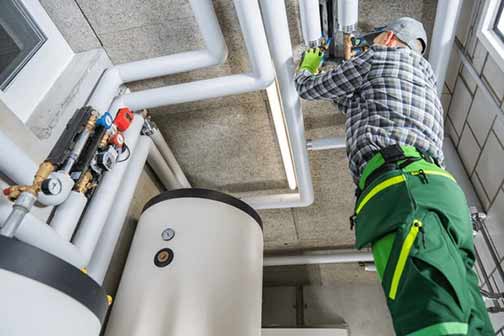
Commercial plumbing systems work the same way as residential plumbing systems. But, Oklahoma Red Door Management says, even though they operate on the same principles, commercial plumbing systems are still very different from residential systems. That is because commercial plumbing is designed for heavier use.
Some of the distinguishing marks of a commercial plumbing system include:
The size of the network
Commercial plumbing systems are more extensive, spanning several floors. The components of the system are more robust, accounting for the massive volumes of wastewater flowing through the pipes per hour. Commercial plumbing systems also use larger pipes and have more sinks, toilets, and showers. Additionally, they use commercial-grade appliances, such as water heaters and dishwashers.
The complexity of structure
Because of intricate piping layouts that require a lot of expertise to plan, install, and maintain, it is harder to navigate a commercial plumbing system. Commercial plumbing systems also have different water pressure needs than residential systems to meet the demands of multiple fixtures and appliances in the building. Their systems also need to meet stricter health and building requirements.
The level of interconnectedness
These systems exhibit interconnectedness absent in residential plumbing. One damaged pipe on any floor within the complex can affect other floors. The symptoms of problems in one section of the building may show up in a completely different section. Because the ripple effect of problems in the system spreads very fast, it is important to have a skilled commercial plumber managing the system.
Why commercial plumbing maintenance matters
It is hard to understand the pivotal role of plumbing in the day-to-day activities of commercial building occupants until the plumbing stops working. The smallest issues in a commercial plumbing system can have widespread effects because of the number of people it affects.
But professional commercial plumbing maintenance solves a lot of these problems:
- Well-managed commercial plumbing systems play a role in enhancing the overall efficiency of the commercial building with the operations of the businesses within the facility. By preventing business downtimes, optimally functional plumbing systems actually contribute to the bottom line.
- Excellent commercial plumbing maintenance helps you cut maintenance costs. By finding problems early and addressing them adequately, it is possible to lower the financial impact of problems. Also, by preventing premature failure, you prolong the life of the plumbing.
- Good plumbing maintenance saves money on utilities. Due to the number of toilets, faucets, and sinks in a commercial building, water wastage and leaks are huge problems. Fixing minor and major leaks in the plumbing will reduce the building’s utility bills.
- Establish a solid reputation with customers, visitors, and staff. Nothing disrupts business like an overflowing toilet or sewage odors inside your commercial building. These problems can sink your reputation. But well-managed plumbing systems make your commercial building a desirable destination.
To achieve these benefits, the first step is finding a reputable commercial plumber to oversee the maintenance of your commercial plumbing system. A reliable commercial plumber is the secret sauce that helps a commercial plumbing system perform optimally.
Why your commercial building needs a dependable commercial plumber
A reliable commercial plumber ensures the smooth function of your commercial plumbing by doing the following:
Inspect/evaluate the system components
During a maintenance visit, the plumber checks all components of the system to make sure they are working properly. He will do a water usage audit to detect issues of excessive water usage or water wastage. He will assess the building’s sewer and storm-water systems. Among other checks, he will examine the building’s hot water systems for problems.
Comprehensive testing
After a visual inspection of the plumbing, the plumber tests specific features. Water pressure checks, for instance, will be done at various sections of the building. Backflow prevention devices are tested for failure, and drain lines are checked for clogged or blocked pipes that need to be cleaned out. The water pressure and temperature settings for the boiler are also checked.
Preventive maintenance
Preventive maintenance is the heart and soul of a commercial plumber’s work because it is where he addresses the problems uncovered by the previous two steps. Preventive maintenance is vital for two reasons. That is a way to keep the plumbing system working with minimal risk of disruption to people’s lives and businesses. Secondly, preventive maintenance is a powerful cost-saving tool.
Code Compliance
Health and safety requirements for commercial plumbing systems are constantly being updated. It is hard for non-professionals to keep up with these changes. At the same time, newer technologies that help to improve the performance of a commercial plumbing system are being unfolded daily. A competent commercial plumber ensures that the plumbing system evolves constantly to stay up-to-date with regulations and innovations.
The point is that commercial plumbing maintenance is one of those invisible functions that keep the wheels of a commercial building spinning smoothly. It is very difficult to get your overall property management right if you make a mistake here.

